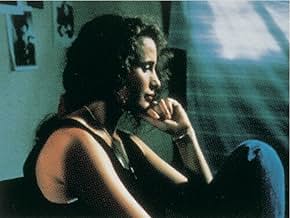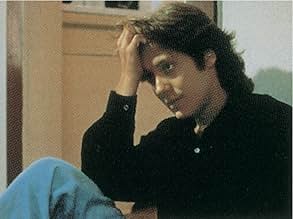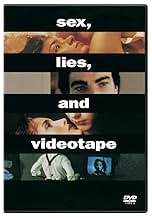A sexually repressed woman's husband is having an affair with her sister. The arrival of a visitor with a rather unusual fetish changes everything.A sexually repressed woman's husband is having an affair with her sister. The arrival of a visitor with a rather unusual fetish changes everything.A sexually repressed woman's husband is having an affair with her sister. The arrival of a visitor with a rather unusual fetish changes everything.
- Nominated for 1 Oscar
- 15 wins & 24 nominations total
- Director
- Writer
- All cast & crew
- Production, box office & more at IMDbPro
Featured reviews
It is a film about relationships, dilemma, courage and more. What works in life and what does not. Honesty does and (crudely speaking) at a very basic level that is the message. At the very heart are the three protagonists who are stuck. The therapist is spectacularly wrong in his interpretation to the apparently frigid wife: 'If you think about it ...you are obsessed about things you have no control over'. But she demonstrates at the end that she did have the control. All she needed was a better, more 'intimate' therapist; a catalyst : Graham ; who ends up uncluttering the cheating sister in law's mind and forces the husband to confront his problems in the process. It is a remarkably optimistic film in its content and therefore perhaps slightly unrealistic.
It is a film about masterful use of contrasts; the two women and the two men could not have been more opposite in every possible respect. In a way Graham is also a perfect contrast to the imperfect Psychoanalyst. This helps the director bring out the message clearly.
The whole film is crafted in a minimalist way, flows smoothly and does not carry much 'garbage'! Music, camera and the narrative are almost perfect in that they are almost invisible. So are the actors, especially James Spader and to a large extent Andie MacDowell. Gallegher is probably less than perfect but very good nonetheless. Laura Giacomo portrays a rather difficult character really well. It treats the audience with respect as the message is subtle and very personal, as it should be. My only grievance is the last office scene involving Gallegher was probably unnecessary.
Sex and the videotapes are incidental to the storey and perhaps misnomers therefore.
It is like reading a rather well written short storey and I would recommend 'Days And Nights In The Forest' (perhaps slightly more realistic and understated than this film) by Satyajit Ray to those who have enjoyed this film.
My rating 8/10.
It is a film about masterful use of contrasts; the two women and the two men could not have been more opposite in every possible respect. In a way Graham is also a perfect contrast to the imperfect Psychoanalyst. This helps the director bring out the message clearly.
The whole film is crafted in a minimalist way, flows smoothly and does not carry much 'garbage'! Music, camera and the narrative are almost perfect in that they are almost invisible. So are the actors, especially James Spader and to a large extent Andie MacDowell. Gallegher is probably less than perfect but very good nonetheless. Laura Giacomo portrays a rather difficult character really well. It treats the audience with respect as the message is subtle and very personal, as it should be. My only grievance is the last office scene involving Gallegher was probably unnecessary.
Sex and the videotapes are incidental to the storey and perhaps misnomers therefore.
It is like reading a rather well written short storey and I would recommend 'Days And Nights In The Forest' (perhaps slightly more realistic and understated than this film) by Satyajit Ray to those who have enjoyed this film.
My rating 8/10.
Sex, Lies and Videotape will probably strike the average viewer as irredeemably degenerate, maybe even perverted, since voyeurism is still considered aberrant behavior. But as far as this film is concerned, that's the appearance, not the reality. Whereas the drama revolves to a certain extent around the voyeuristic masturbation of an impotent man, the heart and soul of the film is an unrelenting, hard driving psychological siege on the biggest erogenous zone of all: the brain.
This film is about sex. But it's not about the frothy swapping of fluids and feelings. It's about honesty, without which one can't have intimacy, which is to sexual stimulation what the water valve is to the hydrant. From beginning to end, we see this theme brought into focus by the dramatic contrast between two different relationships the one based on lies and deceit, the other based upon honesty. And guess which one wins out in the long run?
In a sense, it's what your mother and Sunday school teacher taught you all along. But what makes this movie way more interesting than your mother or Sunday school teacher is the level of honesty it suggests is necessary as the basis of a healthy relationship. Ann (Andy McDowell), for example, an acceptably moral person tells the voyeuristic masturbator `You got a problem.' He replies by adding that he has a lot of problems. But, he says, `They belong to me.'
Somehow, the openness about one's problems renders their bile and poison ineffective. `Lilies that fester,' said Shakespeare, `smell far worse than weeds.'
This film is about sex. But it's not about the frothy swapping of fluids and feelings. It's about honesty, without which one can't have intimacy, which is to sexual stimulation what the water valve is to the hydrant. From beginning to end, we see this theme brought into focus by the dramatic contrast between two different relationships the one based on lies and deceit, the other based upon honesty. And guess which one wins out in the long run?
In a sense, it's what your mother and Sunday school teacher taught you all along. But what makes this movie way more interesting than your mother or Sunday school teacher is the level of honesty it suggests is necessary as the basis of a healthy relationship. Ann (Andy McDowell), for example, an acceptably moral person tells the voyeuristic masturbator `You got a problem.' He replies by adding that he has a lot of problems. But, he says, `They belong to me.'
Somehow, the openness about one's problems renders their bile and poison ineffective. `Lilies that fester,' said Shakespeare, `smell far worse than weeds.'
10Aphex97
Spader's character was the reason I enjoyed the film so much. I could identify with him and his dilemma. It seemed he felt like a stranger in an even stranger land. Who were these humans that seem so happy in the same world he could not find happiness within? What is this life we live? More importantly, what is the point? Why bother? His great battle with existence was a philosophical one. He, like myself, felt infinite sadness over the knowledge that are no concrete answers...
The movie is also interesting because it attacks the main sexual organ, the mind. Graham while trying to distance himself from the human experience by capturing sex confessionals on videotape, perhaps unwittingly became more intimate with his "partners." Roger Ebert points out that the films' argument is that conversation is better than sex.
Personally, I think the movie is about trying to find happiness with another person. Some Modest Mouse song lyrics come to mind. "And it's hard to be a human being/ And it's harder as anything else/ and I'm lonesome when you're around/ I'm never lonesome when I'm by myself" Graham finds it hard to be a human being and live in this human world full of values that he finds strange, confusing, and most importantly unfulfilling. What do you do when your ideology and needs don't mesh in the society you live within? How does one deal with feelings of loneliness in a society that spurns him? This movie is about one man's way.
James Spader does such an excellent job as this character. In fact, great acting all around by the entire cast and excellent writing and directing by Mr. Soderbergh. Go see this movie now!
The movie is also interesting because it attacks the main sexual organ, the mind. Graham while trying to distance himself from the human experience by capturing sex confessionals on videotape, perhaps unwittingly became more intimate with his "partners." Roger Ebert points out that the films' argument is that conversation is better than sex.
Personally, I think the movie is about trying to find happiness with another person. Some Modest Mouse song lyrics come to mind. "And it's hard to be a human being/ And it's harder as anything else/ and I'm lonesome when you're around/ I'm never lonesome when I'm by myself" Graham finds it hard to be a human being and live in this human world full of values that he finds strange, confusing, and most importantly unfulfilling. What do you do when your ideology and needs don't mesh in the society you live within? How does one deal with feelings of loneliness in a society that spurns him? This movie is about one man's way.
James Spader does such an excellent job as this character. In fact, great acting all around by the entire cast and excellent writing and directing by Mr. Soderbergh. Go see this movie now!
Throughout, I felt like a fly on the wall at a psychiatrist's private session with a client. One character asks another an intimate question; the second character responds. Then someone asks another question, to which a low-key response is given, and on and on. I don't recall a movie wherein characters ask each other so many nosy, intimate questions. With its voyeuristic theme, this film gets just a tad too personal for my taste.
Four attractive, thirty-something yuppies, two males and two females, with nothing on their minds but sex, ask, probe, inquire, explore, and poke around each others' psyche, spurred on by one of the male characters (James Spader) who likes to videotape sex interviews with women. Fortunately, Spader gives a convincing performance, one that renders the story credible, if the viewer is interested in this sort of thing.
It's a modern story, similar in some ways to "Carnal Knowledge" (1971), but more up-to-date with the video technology. Scenes are filmed mostly in interiors, which gives the story a claustrophobic feel and a sense of intimacy. We get to know the four characters, maybe a little more than I would have liked. All of them are flawed and therefore very human. The Peter Gallagher character is a scoundrel and easy to dislike. The two women are sisters and very unlike, one an uptight introvert, the other a rather salacious extrovert.
The plot is slow, with long camera "takes". The script is talky. Dialogue trends too on-the-nose at times. The camera is rather static and unobtrusive. I didn't like the grainy visuals of the taped interviews.
Low-budget and very low-key, "Sex, Lies, And Videotape" will appeal to viewers who like films wherein characters talk a lot about sex. There's not much "action". But all that erotic talk substitutes for action. Which is really the whole point of the film.
Four attractive, thirty-something yuppies, two males and two females, with nothing on their minds but sex, ask, probe, inquire, explore, and poke around each others' psyche, spurred on by one of the male characters (James Spader) who likes to videotape sex interviews with women. Fortunately, Spader gives a convincing performance, one that renders the story credible, if the viewer is interested in this sort of thing.
It's a modern story, similar in some ways to "Carnal Knowledge" (1971), but more up-to-date with the video technology. Scenes are filmed mostly in interiors, which gives the story a claustrophobic feel and a sense of intimacy. We get to know the four characters, maybe a little more than I would have liked. All of them are flawed and therefore very human. The Peter Gallagher character is a scoundrel and easy to dislike. The two women are sisters and very unlike, one an uptight introvert, the other a rather salacious extrovert.
The plot is slow, with long camera "takes". The script is talky. Dialogue trends too on-the-nose at times. The camera is rather static and unobtrusive. I didn't like the grainy visuals of the taped interviews.
Low-budget and very low-key, "Sex, Lies, And Videotape" will appeal to viewers who like films wherein characters talk a lot about sex. There's not much "action". But all that erotic talk substitutes for action. Which is really the whole point of the film.
A strange, but very rewarding movie. Soderbergh has went on to create many wonderful films since "Sex, Lies and Videotape" but what has captured my attention about this film is his how he kept the film simple and concentrated on the details around the four characters. He mentions in the commentary of his influence of Eric Rohmer (who created the popular films as part of his "Six Moral Tales") and the long dialogue between characters. Maybe it made no impression to me back then but now, any director who can have their characters engage in dialogue with meaning and profoundness is wonderful.
Andie MacDowell was the surprising star because in the beginning, I thought she would be the typical jilted housewife but we see her character emerge as one that is confused to one that finally gains perspective. Laura San Giacomo did well in portraying the free-will Cynthia (which she would go on to do again in "Pretty Woman"), John Mullany (Peter Gallagher) was the ultimate sleezeball and for Graham (Spader), his character was mysterious and although the viewer doesn't know exactly what had happen to him, it's how the character was changed after changing the character he videotaped. As the film itself, one can see how this independent film helped revolutionize indie films and allowing media coverage. Sure, we see independent films, art-house films receive media coverage today but in the context of independent films getting seen by a wide audience, "Sex, Lies, and Videotape" was definitely instrumental in being part of that small group of films that Hollywood would give a chance to.
Overall rating: 8 out of 10.
Andie MacDowell was the surprising star because in the beginning, I thought she would be the typical jilted housewife but we see her character emerge as one that is confused to one that finally gains perspective. Laura San Giacomo did well in portraying the free-will Cynthia (which she would go on to do again in "Pretty Woman"), John Mullany (Peter Gallagher) was the ultimate sleezeball and for Graham (Spader), his character was mysterious and although the viewer doesn't know exactly what had happen to him, it's how the character was changed after changing the character he videotaped. As the film itself, one can see how this independent film helped revolutionize indie films and allowing media coverage. Sure, we see independent films, art-house films receive media coverage today but in the context of independent films getting seen by a wide audience, "Sex, Lies, and Videotape" was definitely instrumental in being part of that small group of films that Hollywood would give a chance to.
Overall rating: 8 out of 10.
Did you know
- TriviaThe film was playing in Berlin's largest movie theaters when the Berlin Wall fell. A lot of East Germans crossing over to West Berlin went to see it, expecting Western-style porn.
- GoofsWhen Graham is interviewing Ann, Ann sets the camera down on the arm of the chair pointing at the window away from the couch. When Graham gets up to turn it off, it is pointing at the couch.
- Crazy creditsThis film is dedicated to Ann Dollard 1956-1988
- How long is Sex, Lies, and Videotape?Powered by Alexa
Details
- Release date
- Countries of origin
- Language
- Also known as
- Sexe, mensonges et vidéo
- Filming locations
- Baton Rouge, Louisiana, USA(main location)
- Production companies
- See more company credits at IMDbPro
Box office
- Budget
- $1,200,000 (estimated)
- Gross US & Canada
- $24,741,667
- Opening weekend US & Canada
- $155,982
- Aug 6, 1989
- Gross worldwide
- $24,742,453
- Runtime1 hour 40 minutes
- Color
- Sound mix
- Aspect ratio
- 1.85 : 1
Contribute to this page
Suggest an edit or add missing content





























